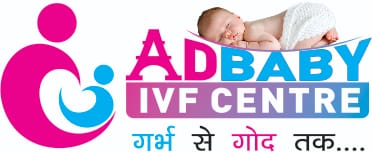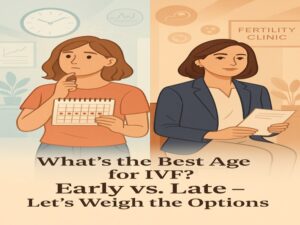Earlier, when women are unable to become mothers, they have to struggle with the stigma for their entire life. Even their near and dear ones always made them feel that they were sterile. However, previously, there was no treatment to deal with such issues. But nowadays, women can dream of becoming mothers. All thanks to IVF, which defeats infertility and allows modern couples to expand their family.
Although IVF has become a certified treatment all over the world, numerous couples are still afraid to try it. There are various IVF misconceptions spreading around that this treatment is not safe.
Here, IVF specialists at ‘Advamed Hospital & Adbaby IVF Centre’ will help you understand what IVF is. How to refute all the myths about it. So, let’s explore together!
What is infertility?
It is a reproductive condition that prevents couples from expanding their family even after having unprotected sexual intercourse for one or more years. It is common to find these days in both men and women. If we talk about women, it may happen due to problems with the womb, eggs as well as hormones.
On the other hand, poor semen, low sperm count, or quality are responsible for infertility among male partners. This condition is stressful plus emotional for couples wanting to become parents.
In-vitro fertilization: What Is It?
IVF is a medical procedure. It is designed for couples who are unable to conceive pregnancy even after trying continually for the past one or two years. During this treatment, an IVF expert collects a woman’s eggs from the ovaries and combines them with the male sperm. Everything is done outside the female’s body in a laboratory.
Now, a doctor stores this combination in an incubator until it becomes a healthy embryo. The process of embryo development may take five to six days. Once the embryo forms, it is directly placed in a woman’s uterus.
Besides this, many go for this treatment after trying several other fertility treatments without success. It is also used by same-sex couples, single parents, plus those with certain medical conditions.
Common Myths About IVF & the Truths Behind Them
These are the common myths and facts that mislead couples that IVF is not safe for them:
Myth: IVF Always Works on the First Try
Fact: Well, many factors influence the successful competition of IVF treatment. These aspects can be:
- The woman’s age
- Egg & sperm quality
- The cause of infertility
- Lifestyle factors (such as smoking, weight & stress)
If talked about, on average, younger females are more likely to conceive pregnancy with IVF on the first attempt. Women in 35 or below age have a 40 to 50% chance of getting pregnant per IVF cycle. On the other hand, female who are in their 40s might have lower chances. You can visit your nearest fertility clinic based on your case for more realistic outcomes.
Myth: IVF Is Only for Older Women
Fact: There is no age limit to have this treatment. Every couple struggling to conceive naturally can adopt this method to expand their family. IVF is made for:
- Young couples with blocked fallopian tubes or male infertility
- Same-sex couples or single parents may use IVF with donor eggs or sperm
- Some individuals freeze their eggs or embryos at a younger age for future use
Myth: IVF Babies Are Not Healthy
Fact: This is ridiculous. IVF babies are as healthy as naturally conceived babies. There is no proof that IVF babies are not healthy. Since 1978, numerous healthy babies have been born with IVF. The process does not change the baby’s DNA or increase risks when done correctly.
If a doctor performs the whole IVF procedure with proper care and safety, there is no chance of any mistakes or an unhealthy infant.
Myth: IVF Always Results in Twins or Triplets
Fact: It happened earlier when doctors transferred more than one embryo into the woman’s uterus to enhance the chances of pregnancy. They might think that if a single embryo is unable to work, then others may achieve success. That is the reason that couples give birth to twins or triplets.
To overcome this risk, these days, single embryo transfers (SET) are used, especially in the case of younger females.
Myth: IVF Is Painful and Risky
Fact: Not every treatment is painless. Similarly, It involves mild discomfort, but generally, it’s a safe procedure. During IVF, a woman passes via the following:
- Hormone injections: It may cause bloating or mood changes
- Egg retrieval: It is done under mild sedation — no major pain
- Embryo transfer: It is quick & simple, like a pap smear
IVF becomes a secure procedure when done in a reputable fertility clinic. As with all medical treatments, some level of discomfort is there. Most doctors describe this clearly and assist in making you feel at ease.
Myth: You Must Be Married to Do IVF
Fact: There are no boundaries for trying this treatment. It is not limited to married couples. IVF is available for different family types, such as:
- Unmarried couples
- Single women or men who want to become parents
- Same-sex couples
- People using donor sperm or eggs
Regulations of IVF may be different in each country or state, so it is wise to look at the rules specific to your place.
Myth: IVF Is Only for Women
Fact: Male fertility is just as important as females. IVF treatment is not only made for one partner; it addresses both partners. In nearly 40-50% of situations, infertility from the male side contributes. This is why:
- Men are tested for sperm count and quality
- Healthy lifestyle changes can improve male fertility
- ICSI (Intracytoplasmic sperm injection) may be used to help fertilize the egg
So, IVF is not just a “woman’s treatment” — both partners may need support.
Myth: IVF Treatment Is Too Expensive
Fact: The cost of IVF varies due to several factors. Many couples find it cheap, while others may find it costly. However, financial help is also available for this treatment. Several IVF centers offer:
- Flexible payment plans
- Packages for multiple cycles
- Discounts for early payment
- Insurance coverage (in some countries or under specific plans)
You can ask your IVF center about potential options. Some couples also use fundraising or grants to manage their costs.
Myth: Lifestyle Has No Effect on IVF Success
Fact: Many couples think IVF will help them to have a baby even if they eat unhealthy foods & drinks. Unhealthy habits can decrease your chances. Your way of living greatly influences the success of IVF. You can enhance your possibilities by:
- Eating a balanced diet
- Exercising regularly (but not too much)
- Avoiding alcohol, tobacco, and caffeine
- Taking prenatal vitamins as advised
- Reducing stress through yoga, meditation, or hobbies
A fertility hospital in Chandigarh can provide you with advice on the most effective measures to take before & throughout IVF treatment.
Frequently Asked Questions:
Some common questions you may ask:
1. How long does an IVF cycle take?
As per the research, the IVF cycle takes 4–6 weeks on average. The procedure begins with hormone injections & ends with embryo transfer.
2. Is IVF the only option for infertility?
No, doctors may suggest medication, IUI (Intrauterine insemination), or surgery before IVF depending on the main cause of your problem.
3. Can IVF be done naturally?
There is a version called “Natural IVF,” where minimal or no hormone drugs are used. It’s suitable for some people but not all.
4. Is IVF safe for women over 40?
Yes, but success rates are lower. Some women who are plus 40 years old may use donor eggs to boost their chances of getting pregnant.
5. Will my child know they were born through IVF?
There is no hard and fast rule about this. It is your personal choice. If you want to share this with them, you can. It does not affect the love or bond with your child.
IVF is a powerful medical option for infertile couples. Till now, it has helped millions of couples to become parents. But, IVF myths and misunderstandings often create fear or hesitation. If you are planning to have IVF, it’s recommended to speak directly with a trusted fertility hospital.
Always remember that every fertility journey is unique. With the proper support, patience as well as information, IVF can be a successful step toward building your dream family.
If you still have questions, please contact us at ‘Advamed Hospital & Adbaby IVF Centre.’ Our IVF experts will guide you in the right direction.











